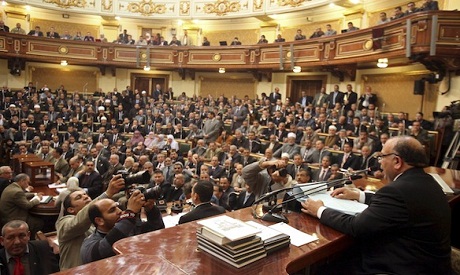At least 75 people have been killed after a riot erupted during an Egyptian League football match in Cairo, the Ministry of Health said on Wednesday.
The ministry also said that at least 200 people were injured after fans chased Al Ahly soccer players after they lost a match to the home team.
The fans cornered supporters on the field in the port city of Port Said and around the stadium, throwing stones and bottles at them.
The ministry also said that at least 200 people were injured after fans chased Al Ahly soccer players after they lost a match to the home team.
The fans cornered supporters on the field in the port city of Port Said and around the stadium, throwing stones and bottles at them.
The game was between Al Ahly, one of Egypt’s most successful clubs, and al-Masry, a team based in Port Said. Live television footage showed fans running onto the field and chasing Ahly soccer players.
Hesham Sheiha, deputy health minister, told state television most of the injuries were caused by concussions and deep cuts, calling the incident “unfortunate.”
“The players’ room has turned into a morgue,” Ahmed Nagy, the team’s goalkeeper coach said on the scene.
Violence at football matches across north Africa has increased significantly since political unrest sweeping across the region began more than a year ago.
Egyptian Islamists, meanwhile, blame supporters of ousted Predisent Hosni Mubarak for the deadly football violence, AFP news agency reports.
Another match in Cairo was halted by the referee after receiving news of the violence in Port Said, prompting fans to set parts of the stadium on fire, television footage showed.
Part of the stadium is currently engulfed in flames, according to live television footage on the Egyptian state channel.
Ahly player Mohamed Abo Treika described the violence as war as Masry fans invaded the pitch after the referee blew the whistle, even though the team had beaten Ahly 3-1.
“This is not football. This is a war and people are dying in front of us. There is no movement and no security and no ambulances,” Abo Treika told the Ahly television channel. “I call for the premier league to be cancelled. This is horrible situation and today can never be forgotten.”
State television quoted Sheiha as saying that most of the injuries were caused by concussion and deep cuts.
The Egyptian parliament is to hold emergency session on Thursday over the Port Said soccer violence.
47 people have been arrested over the deadly incident, Al Arabiya television reported.
Meanwhile, Egypt’s football federation indefinitely delayed premier league matches after the violence, state television reported. Egypt’s parliament would hold an emergency session on Thursday, according to state media reports.
Egypt’s state prosecutors have ordered an investigation into the pitch invasion and the violence that ensued, judicial sources told Reuters news agency.
Hesham Sheiha, deputy health minister, told state television most of the injuries were caused by concussions and deep cuts, calling the incident “unfortunate.”
“The players’ room has turned into a morgue,” Ahmed Nagy, the team’s goalkeeper coach said on the scene.
Violence at football matches across north Africa has increased significantly since political unrest sweeping across the region began more than a year ago.
Egyptian Islamists, meanwhile, blame supporters of ousted Predisent Hosni Mubarak for the deadly football violence, AFP news agency reports.
Another match in Cairo was halted by the referee after receiving news of the violence in Port Said, prompting fans to set parts of the stadium on fire, television footage showed.
Part of the stadium is currently engulfed in flames, according to live television footage on the Egyptian state channel.
Ahly player Mohamed Abo Treika described the violence as war as Masry fans invaded the pitch after the referee blew the whistle, even though the team had beaten Ahly 3-1.
“This is not football. This is a war and people are dying in front of us. There is no movement and no security and no ambulances,” Abo Treika told the Ahly television channel. “I call for the premier league to be cancelled. This is horrible situation and today can never be forgotten.”
State television quoted Sheiha as saying that most of the injuries were caused by concussion and deep cuts.
The Egyptian parliament is to hold emergency session on Thursday over the Port Said soccer violence.
47 people have been arrested over the deadly incident, Al Arabiya television reported.
Meanwhile, Egypt’s football federation indefinitely delayed premier league matches after the violence, state television reported. Egypt’s parliament would hold an emergency session on Thursday, according to state media reports.
Egypt’s state prosecutors have ordered an investigation into the pitch invasion and the violence that ensued, judicial sources told Reuters news agency.


